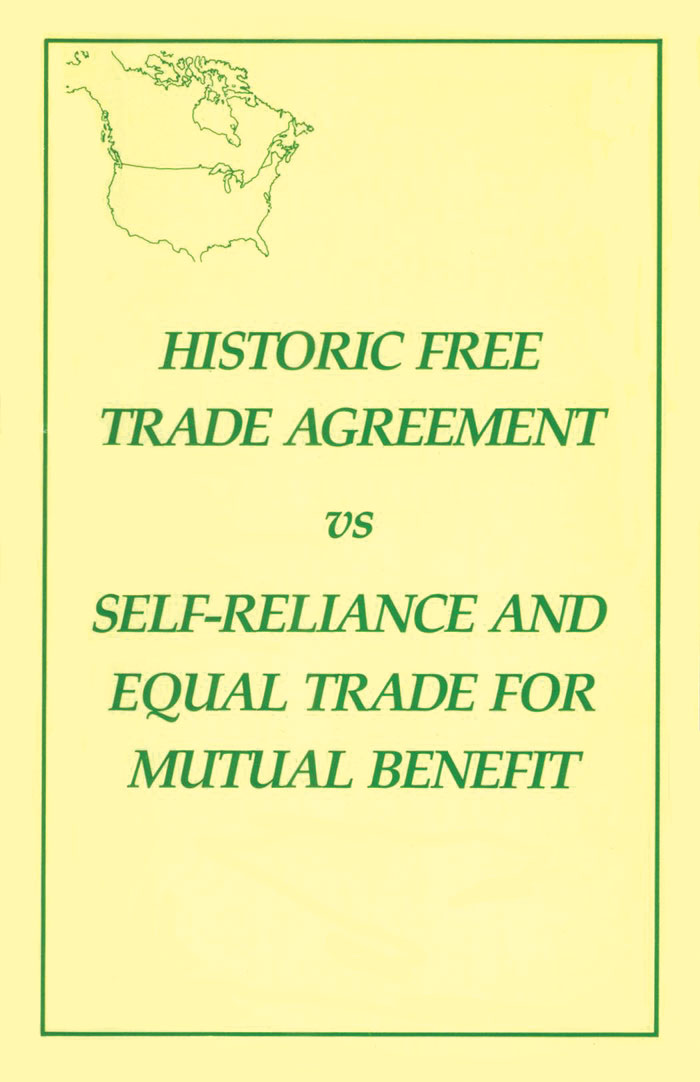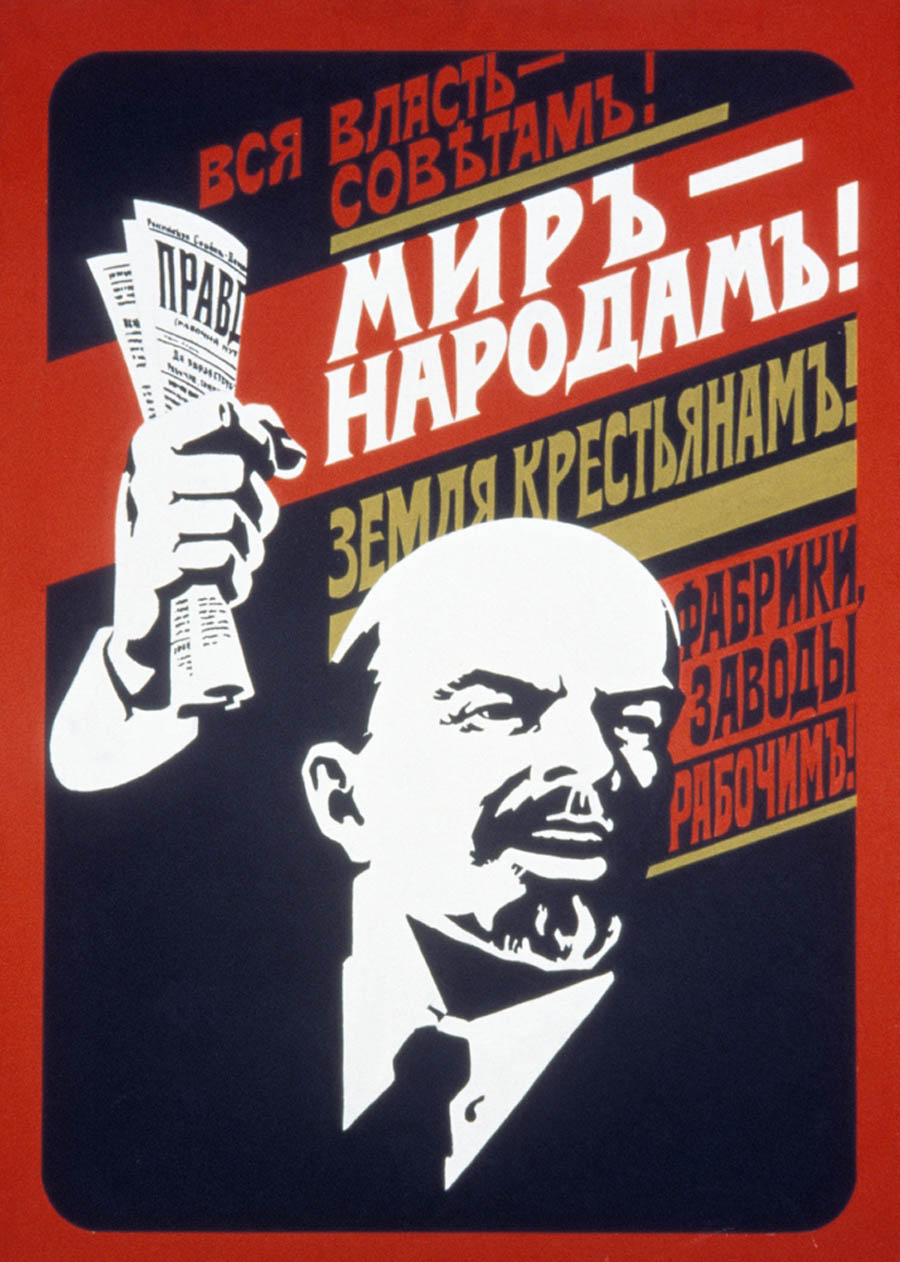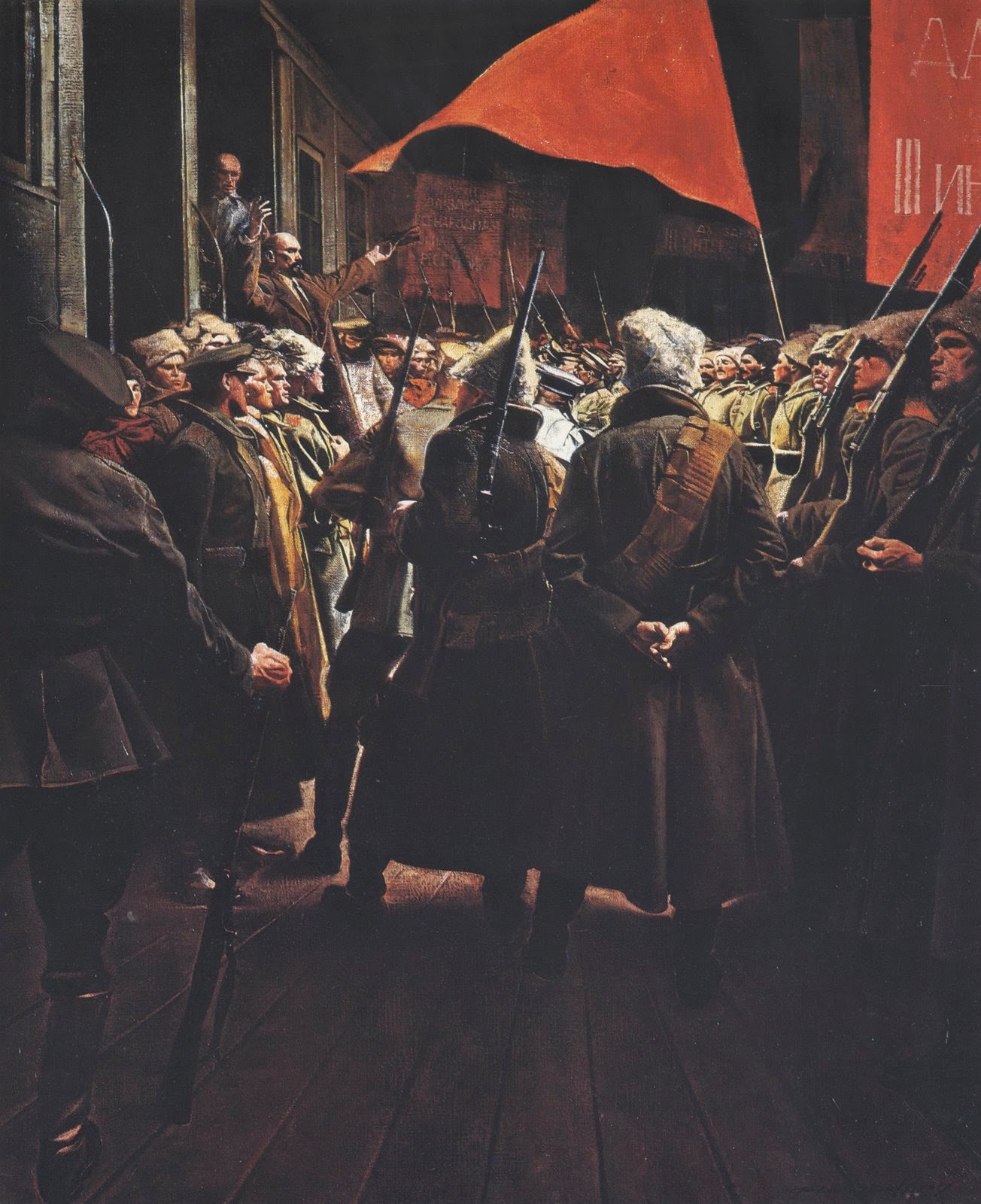
|
May 6, 2017 - No. 16 Arguments About
Trade Must Not Be
Inter-Monopoly
Competition
Over
Softwood
Lumber
Get Canada Out of NAFTA! Arguments About Trade Must Not Be Pitted
|
|
|
"It is generally said that trade wars are inherent in the present world economic order, and it is also well-known that trade wars lead to wars. The free trade agreement, which is labelled historic and which has incited such passions on both sides, is a signal that the trade wars have assumed a new dimension. The agreement does not put an end to the trade war between Canada and the United States, but raises it to a new and higher level. The financiers, the bankers, the monopolists -- in other words, those economic giants who control the economy, have intensified their fights with one another. The concentration of production and capital, the mergers and takeovers and bankruptcies which ushered in the new period of concentration of production and capital since the crisis of 1981-82, have led to the clamour for markets. Ever-escalating trade wars were the inevitable consequence."[6]
It is now 2017 and the claim that free trade guarantees prosperity and eliminates trade wars, which are blamed on protectionism, continues to be made irrespective of the fact that free trade and protectionism are two sides of the same coin. The current disputes over the free trade agreements are in fact a reflection of the dangerous proportions which the trade wars have assumed. It is more urgent than ever to not pit arguments against free trade against the need to change the direction of the economy and for renewal. It is more urgent than ever to strengthen the unity between the working class in Canada, the U.S. and Mexico to carry trade on the basis of the mutual benefit of the peoples of the world, not the molochs of finance capital fighting to concentrate ever more economic and political power in their hands.
Get Canada Out of NAFTA!
Manufacturing
Yes!
Nation-Wrecking No!
Notes
1. "The Resignation of Brian Mulroney," TML Daily, February 27, 1993.
2. Hardial Bains, "What Are the Liberals Going to Do?," TML Daily, October 19, 1993.
3. Hardial Bains, "Desperation, Diversion and Morbid Preoccupation with Defeat," TML Daily, October 23, 1995.
4. Hardial Bains, "For a Progressive Social Policy, Against Retrogressive Pressure," TML Daily, January 23, 1993.
5. "Hardial Bains Accuses Liberals of Destroying the Canadian Nation State," TML Daily, October 22, 1994.
6. Historic Free Trade Agreement vs Self-Reliance and Equal Trade For Mutual Benefit, New Magazine Publishing Company, 1987.
Inter-Monopoly Competition Over Softwood Lumber
Forestry Workers Demand a New Direction
for Their
Industry
In March, forestry workers, allies and community members took part in
meetings in five cities and towns in northern BC to discuss problems in
their sector and the way
forward.
Pictured here is the Mackenzie meeting, March 14, 2017.
Lumber oligopolies manipulate the sector for a big score and to expand their domination and control
Canadian forestry workers in the softwood sector are under siege yet again. The dominant forestry oligarchs in North America have unleashed yet another fraud to increase their profits and grip on the sector. Led by the Weyerhaeuser oligopoly, the lumber barons are manoeuvring for increased market prices for lumber and the collapse of smaller Canadian companies to strengthen their domination. Under the hoax of a challenge to unfair pricing and dumping of Canadian lumber in the U.S. market, the lumber barons who operate throughout Fortress North America want to inflate artificially through tariffs the market price of Canadian supplied softwood lumber to make a big killing with higher prices for all lumber. The fraud is such that Weyerhaeuser and others that are poised to profit from the inflated prices, such as the big three lumber companies in BC, control mills throughout North America. The victim is not just the U.S. housing market, which will be forced to pay thousands more per new house making it unaffordable for many but Canadian forestry workers whose livelihoods and incomes are gravely threatened and smaller companies whose existence hangs in the balance.

Canadian softwood lumber supplies over 30 per cent of the U.S. market. Mills in the U.S. are not capable of making up the shortfall if Canadian supply is curtailed, putting further upward pressure on lumber prices. The U.S. Treasury department is imposing an average 20 per cent surcharge on lumber at the border that most companies in Canada will have to pay in advance forcing them to seek higher market prices to make up the difference. Experts predict that in the short term the U.S. market will be disrupted with an orchestrated shortage of lumber and buyers hesitant or unable to pay higher prices. Small companies in Canada may have to curtail production, close their mills or sell their facilities to the oligopolies that already dominate the sector.
Weyerhaeuser and other big producers will reap the benefit of higher prices for lumber supplied from their U.S. mills, and from the greater concentration of production in Canada in the hands of the empire builders, as smaller producers are squeezed out of business.
The fraud is presented as a softwood lumber dispute between the U.S. and Canada but it is nothing of the sort. The so-called dispute is a well-orchestrated assault of a section of the financial oligarchy on other sections, those who buy lumber, smaller lumber companies and on forestry workers and their communities. The oligarchs have conspired and unleashed a scheme to pay the rich from higher prices and greater market share, and to concentrate lumber facilities and social wealth in the hands of the dominant oligopolies.
Forestry workers and their allies in their communities are discussing how to turn the situation around in their favour. The central issue is how to exercise control over their lives for which they need to exercise control over their sector of the economy and its direction. Without the actual producers having a say over the decisions which affect their lives and a say and control over the production and distribution of the forestry social product, as well as over the value workers produce and how and where the added-value is invested, the domination of the financial oligarchy will continue regularly to wreak havoc in their lives.
Control means at its core
the ability to make the
decisions
on those issues that affect the lives of the working people,
their communities and economy. This begins with control over the
governments which take the decisions and control of the forestry
sector and its direction, along with control over production,
distribution, the price of production according to set norms and
science, and retention and investment of the added-value workers
produce within the local and Canadian economy for extended
reproduction. Control means the ability of the people to decide,
and to say no if needed to defend their rights based on full
information and discussion. In the case of softwood lumber, it
begins with saying No! to the plunder and exploitation taking
place at the expense of the workers and their communities in not
only Canada and the U.S. but any other country slated to receive
softwood lumber from Canada.
Enough of this constant disruption and wrecking by the oligarchs in control!
The time is now to organize for a new direction for the
economy under the control of the working people!
(May 3, 2017)
Orchestrated Attack of Forestry Oligarchs
 The private oligopolist
firms in
the forestry sector, which operate throughout Fortress North America,
have demanded that the U.S. state organize a fraudulent softwood lumber
dispute with Canada. They filed a petition with the U.S. Department of
Commerce last year to investigate a complaint of subsidized Canadian
lumber being dumped on the U.S. market. This is the fifth time since
the 1980s that the oligarchs have unleashed a similar scam. Each time
they reap a big score in high lumber prices, and increase their
domination of the sector by seizing control of small and medium-sized
Canadian lumber producers that are weakened from the attack.
The private oligopolist
firms in
the forestry sector, which operate throughout Fortress North America,
have demanded that the U.S. state organize a fraudulent softwood lumber
dispute with Canada. They filed a petition with the U.S. Department of
Commerce last year to investigate a complaint of subsidized Canadian
lumber being dumped on the U.S. market. This is the fifth time since
the 1980s that the oligarchs have unleashed a similar scam. Each time
they reap a big score in high lumber prices, and increase their
domination of the sector by seizing control of small and medium-sized
Canadian lumber producers that are weakened from the attack.
Just the threat of duties on Canadian supplied lumber since the expiry of the latest Canada-U.S. softwood lumber agreement in October 2015 and the failure to reach a new agreement has already contributed to a more than 20 per cent surge in lumber prices in the U.S. market. The manipulators of lumber futures on the Chicago commodities market have likewise seen their fictitious paper social wealth jump by more than a fifth, and anticipate even more gains with the imposition of duties.
According to reports, for this year alone the largest forestry companies behind the fraud expect to seize at least one per cent of the imported market share from smaller Canadian softwood lumber suppliers. One per cent amounts to about $60 million of lumber imports annually. Going on the experience of the previous four times the dumping fraud has occurred, Canadian lumber exports into the U.S. market of all but the largest companies will be tied up in endless U.S. Commerce Department audits and legal expenses. With duties applied to cash deposits from all but a select few of the largest exporters, the oligarchs in both Canada and the U.S. will gain far more than one per cent of the market from the smaller producers forcing those negatively affected to reduce production and possibly go out of business or sell their mills to the oligarchs. Whether the export duties are eventually upheld or not according to existing trade agreements, prices will have risen above their prices of production and the concentration of the sector in the hands of the few dominant companies will accelerate.
The previous subsidy/dumping fraud ran for over five
years, from April 2001 (after the expiry of the 1996 Softwood Lumber
Agreement), to the signing of the 2006 Softwood Lumber Agreement
between the governments of Canada and the United States. Within months
after the imposition of U.S. duties of around 27 per cent in 2001,
15,000 Canadian forestry workers were laid off along with the closure,
scaling back or sale of many small and medium-sized lumber mills.
 The sector rebounded a few
years later from the expansion of the U.S. housing market that had been
recklessly promoted by the financial oligarchy through subprime
mortgages bundled together for sale and resale globally as fictitious
social wealth. The fraud in the housing sector and bond market
collapsed in chaos in 2008, as it became clear that most of the
subprime mortgages (and auto loans) and the bundled bonds were
worthless, as individuals could not meet their payments. The collapse
in the U.S. housing and auto markets and ensuing general economic
collapse generated a profound crisis in the softwood lumber sector,
from which it has not fully recovered.
The sector rebounded a few
years later from the expansion of the U.S. housing market that had been
recklessly promoted by the financial oligarchy through subprime
mortgages bundled together for sale and resale globally as fictitious
social wealth. The fraud in the housing sector and bond market
collapsed in chaos in 2008, as it became clear that most of the
subprime mortgages (and auto loans) and the bundled bonds were
worthless, as individuals could not meet their payments. The collapse
in the U.S. housing and auto markets and ensuing general economic
collapse generated a profound crisis in the softwood lumber sector,
from which it has not fully recovered.
During the period since the economic collapse in 2008, over 100 BC mills have closed with the loss of 35,000 forestry jobs. The closure of mills has been accompanied with a dramatic surge of BC raw log exports not only to Asia but also to mills in the United States organized by the lumber oligarchs with the connivance of the BC Liberal government.
The ruling imperialist elite have consistently blocked any opening towards an independent self-reliant economy in the forestry communities, which could use the value forestry workers produce to broaden the economy in the BC interior, coastal regions and throughout Canada into a viable and sustainable manufacturing sector, social programs and public services. Such a nation-building direction is the social responsibility of the working class to organize and implement, as those presently in control have been proven unfit to rule.
The bluster coming from Prime Minister Trudeau and BC
Premier Clark in response to this fifth fraudulent softwood lumber
dispute throws sand in the eyes of workers and forestry communities
affected by the crisis. Without directly confronting
the lumber oligarchs and depriving them of their domination and
control over the sector, the attacks on Canada's economy and
forestry communities will continue. The official politicians
within the outmoded cartel party system represent the financial
oligarchy and will do nothing of substance to deprive the
oligarchy of its power to deprive Canadian working people of
their right to a nation-building project that guarantees their
well-being and security and serves the general interests of
society.
At forums, such as this one in Prince George, April 12, 2014, forestry
workers and those in their communities discuss solutions to the
problems in the industry that would favour them.
The largest BC lumber producers such as West Fraser Timber and Canfor are even cynical in the extreme, hinting strongly that they are now in a good position not only to weather the orchestrated dispute but profit from it. They have greatly expanded their control of sawmills in the U.S. and can even rely on the export of raw logs from BC to supply their mills, avoid U.S. duties and take direct advantage of increased lumber prices. The surge in lumber prices fattens their claim of added-value from their U.S. mills.
If nothing is done to deprive the financial oligarchy of its power, forestry workers and their communities will suffer and the struggle of smaller Canadian mills in the face of the export duties and legal expenses will make them vulnerable to takeover, leading to further concentration of Canadian lumber production in the hands of the dominant oligarchs.
The Softwood Lumber Industry
and the Current Crisis
The forest monopolies engage in constant battles with each other, to expand their empires with greater market share, and with U.S. buyers of softwood lumber over market prices. The largest buyers of lumber are in themselves huge oligopolist firms with tentacles stretching into finance, construction, manufacturing and the retail sectors. The battle for empire-building, market share and prices is constant and yet another source of disruption and chaos in the socialized economy leading to recurring crises.
Canadian softwood lumber
supplies over 30 per cent of the U.S. market, which means it exercises
influence over the market price and is a target of empire-building of
the largest private interests. The North American forestry oligarchs
interfere directly in Canada's affairs by periodically disrupting
equilibrium in the U.S. market through orchestrating a dispute over the
price of Canadian lumber. The main issue they use is ground rent or the
amount those in control of the forests claim from the added-value
forest workers produce as softwood lumber.
In Canada, much of the forest is Crown land. The ground rent from lumber production, a portion of the added-value or profit workers produce, is claimed as a state stumpage fee on the amount of trees or cubic metres of timber harvested. Certain oligarchs raise the issue that the stumpage fee appears to be lower in Canada than the ground rent or profit claimed from privately-owned forests in the United States. They say the Canadian situation amounts to a state subsidy reducing the price of production making Canadian lumber cheaper.
Subsidies and other pay-the-rich schemes are common throughout the imperialist system of states in all sectors. They greatly benefit the financial oligarchy and strengthen its dominance over the economy. The oligarchs only make a self-serving fuss about subsidies or other pay-the-rich schemes when it favours their private interests to do so. This is evident in the lumber dispute as those that suffer its consequences are rival oligarchs who buy lumber, forestry workers, and the smaller lumber mills that lose market share and become victims of collapse or seizure by the forestry giants and their empire-building.
Certain lumber oligarchs petitioned the U.S. Department of Commerce to investigate the following programs that are specific to BC: BC stumpage pricing policy, BC Log Export Policy, BC Hydro PowerSmart, BC Hydro Electricity Purchasing Agreements, and the Motor Fuel Tax Refund For Off-Highway Purposes.
These programs, whatever one thinks of them, are the sovereign right of a nation to implement under its particular system and ruling class in control. For another nation to object to those policies as unfairly affecting its domestic business is also a matter of its sovereign right to comment, complain and refuse to import the goods in question. Nevertheless, the objection to another nation's domestic economic policies should not extend to interference with its sovereign right to implement internal economic policies of its own choosing.
Canadians are not forcing buyers in the U.S. to purchase cheaper Canadian lumber just as the Chinese are not forcing USians to buy cheaper Chinese steel, textiles or other commodities. If the U.S. buyers of cheaper Canadian lumber have another more expensive U.S. source, which satisfies their needs and makes them happy, so be it.
 The problem arises from the
fact that neither the U.S.
nor
Canadian people are sovereign in their own nation. They exist
within the U.S.-led imperialist system of states dominated by the
ruling oligarchs. The oligarchs control international trade and
decide its terms. The decisions of what to buy and what not to buy,
what to sell and what not to sell and the prices are those of the
ruling oligarchs. The fights they engage in are inter-imperialist
fights and the noise surrounding them distracts the working class
from the reality that the ruling oligarchs cannot and will not
sort out any economic problems confronting their particular
nations. They are empire-builders concerned with their own narrow
private interests; they are not nation-builders.
The problem arises from the
fact that neither the U.S.
nor
Canadian people are sovereign in their own nation. They exist
within the U.S.-led imperialist system of states dominated by the
ruling oligarchs. The oligarchs control international trade and
decide its terms. The decisions of what to buy and what not to buy,
what to sell and what not to sell and the prices are those of the
ruling oligarchs. The fights they engage in are inter-imperialist
fights and the noise surrounding them distracts the working class
from the reality that the ruling oligarchs cannot and will not
sort out any economic problems confronting their particular
nations. They are empire-builders concerned with their own narrow
private interests; they are not nation-builders.
The working people are blocked from discussing and making rational decisions concerning the economy, including international trade and its terms. The global oligopolies are in control and they dictate what to buy or not to buy according to their narrow private interests for empire-building. Their decisions and fights regarding so-called free trade, bilateral trade, mutual trade, terms of trade or what to buy or sell are based on their private interests and empire-building. Their decisions have nothing to do with the broad interests of the working people and independent nation-building to serve the well-being, rights and security of all and to promote peace, development and friendship internationally amongst all humanity.
The U.S. softwood complaint is a private matter of certain oligopolist firms and their allies. The response of the state is to serve their private interests. The dispute is not one of national interests even though it results in significant injury to the people and economy not only in Canada but also in the United States.
The U.S. Department of Commerce announced on December 15, 2016 that it was proceeding with an investigation of four large companies exporting Canadian lumber into the U.S. market: Canfor, Resolute, Tolko and West Fraser. J.D. Irving, with mills in the Maritimes and the U.S., voluntarily joined the investigation.
Note the "company-specific" nature of the softwood complaint. Companies operating in the U.S. initiate the complaint, which identifies and investigates specific companies operating in Canada and assesses particular penalties. The smaller companies are lumped together using an average penalty and suffer jointly, forced to pay upfront cash duties. Specific large companies operating in Canada are exempt from the upfront cash duties and even benefit with higher market prices and greater market share and concentration of social wealth.
Canfor and Interfor now control more lumber mills in the U.S. than in Canada and stand to profit from higher lumber prices and from the chance to expand their empires by buying Canadian lumber mills damaged in this orchestrated dispute.
In January, the U.S. International Trade Commission ruled that Canadian softwood lumber exports had injured the U.S. industry. On April 24, the U.S. Department of Commerce issued a preliminary determination of countervailing duty rates as follows -- West Fraser: 24.12 per cent, Canfor: 20.26 per cent, Tolko: 19.50 per cent, Resolute: 12.82 per cent, J.D. Irving: (which was a "voluntary respondent") 3.02 per cent, and "all others": 19.88 per cent. It also issued a preliminary finding of "critical circumstances" (significant increase in Canadian lumber exports) for J.D. Irving and the "all others" group of companies, but not for Canfor, Resolute, Tolko and West Fraser.
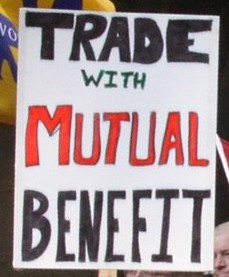 "Critical circumstances"
means that Irving and all other companies except the four mentioned
will need to pay in cash the countervailing duties on all their lumber
exports to the U.S. retroactive to about January 31, (90 days prior to
the notice being published in the U.S. federal register, expected soon)
and for the next four months after that. This ruling means that all
small and medium-sized companies are forced to pay cash for the duties
not only on new shipments but for all their shipments since around
January 31. After the four-month period, no cash deposits for
countervailing duties will be required until the final determination
order is issued in January 2018 at which time all duties must be paid
when assessed.
"Critical circumstances"
means that Irving and all other companies except the four mentioned
will need to pay in cash the countervailing duties on all their lumber
exports to the U.S. retroactive to about January 31, (90 days prior to
the notice being published in the U.S. federal register, expected soon)
and for the next four months after that. This ruling means that all
small and medium-sized companies are forced to pay cash for the duties
not only on new shipments but for all their shipments since around
January 31. After the four-month period, no cash deposits for
countervailing duties will be required until the final determination
order is issued in January 2018 at which time all duties must be paid
when assessed.
The penalties for dumping will be issued June 23. The accusation of dumping is separate from the state subsidy issue. It relates to the allegation of selling a product below its estimated price of production. The Department of Commerce bases its calculation of a price of production on capital-centred U.S. methods, standards and circumstances, not those in Canada.
A countervailing duty regarding the issue of "unfair" state subsidies is a duty assessed by the U.S. government on Canadian exports of lumber to the United States. The U.S. argues that the duty is required to offset "unfair subsidies that Canadian and provincial governments provide to lumber companies." The U.S. considers the stumpage fee charged for logging on Crown land to be unfairly low compared to what logging companies have to expend to log in U.S. forests, which are almost all privately-owned and claim greater ground rent as their share of the profit or added-value workers produce harvesting and milling timber. The main claims on the added-value workers produce are interest profit, enterprise (or equity) profit, rent, and claims of government. The proportion of the claim on added-value going to each claimant should not affect its total size or the price of production. However, the power of the oligopolies is such that they can manipulate market prices to their own advantage and denounce as bad the claims of others on the value workers produce. They do not take into consideration whether or not their actions may damage the broad economy and contribute to an economic crisis.
Softwood exports include all dimensional lumber products from coniferous species (trees that have cones, such as spruce, pine and fir). Commodities include flooring, siding, finger-jointed lumber, cedar products and others.
In 2016, BC shipped about $4.6 billion in softwood lumber products to the U.S.
| Statistics
on
BC
Forest
Industry
from
BC
Ministry
of
Forests,
Lands and Natural Resource Operations |
2006
|
2016
|
| BC timber harvested (million cubic metres) | 80.3 | 66.1 |
| BC softwood lumber production (million cubic metres) | 35.5 | 32 |
| U.S. Housing Market Starts (million) | 1.8 | 1.18 |
| B.C. lumber exports (CDN$ billion) to U.S. | $4.30 | $4.60 |
| B.C. lumber exports
(CDN$ billion) to China |
$0.08 | $1.02 |
| B.C. lumber exports
(CDN$ billion) to other countries |
$1.46 | $1.33 |
| BC's market share of U.S. lumber sales (per cent) | 19.52 |
17.51 |
| Canada's market share of U.S. lumber sales (per cent) | 33.2 |
30.42 |
| BC's share of Canadian exports of softwood lumber to U.S. (per cent) | 59 |
55 |
The BC Ministry of Forests, Lands and Natural Resource Operations said in response to the U.S. duties: "We expect there will be mill closures or curtailments over the next five years as companies rationalize their operations due to the decline in timber supply as a result of the mountain pine beetle infestation.
"It is possible that, depending on the amount of duties levied, some mills may close or curtail production sooner than originally anticipated."
180th Anniversary of 1837-38 Rebellions in Upper and Lower Canada
For a Modern Constitution Which Vests
Decision-Making Power
in the People, Not the Crown
Montreal
Conference
Sunday, May 7 -- 10:00 am - 4:30 pm
Cégep de Rosemont, Room B-541 6400, 16th Ave.
(Metro Beaubien - #18 bus)
Organized
by
the
Marxist-Leninist
Party
of
Quebec
(PMLQ)
For information: bureau@pmlq.qc.ca (514) 522-5872
http://pmlq.qc.ca
Registration: $15 (lunch included)
Please register in
advance to facilitate the lunch order.
 In May we celebrate the 180th anniversary of
the
1837-38
rebellions in Upper and Lower Canada. This year, the federal
government is also celebrating the 150th anniversary of
Confederation.
In May we celebrate the 180th anniversary of
the
1837-38
rebellions in Upper and Lower Canada. This year, the federal
government is also celebrating the 150th anniversary of
Confederation.
The Marxist-Leninist Party of Quebec (PMLQ) invites you to participate in a conference on the conception of rights fought for by the Quebec Patriots in 1837-38 and the conception contained in the Constitution of Canada, established by Royal Proclamation in 1867 (British North America Act, 1867). The institutions established by the British at that time vested sovereignty in the Crown, not the people. The conception of rights they continue to uphold was defined in the course of suppressing the Quebec nation and dispossessing and committing genocide against the Indigenous peoples.
The conference will explore these themes from the angle of addressing the problem the working class and people and their societies face today -- how to involve the people in taking the decisions which affect their lives. Ruling elites have taken over what are called the democratic institutions to launch a vicious neo-liberal anti-social offensive and are establishing governments of police powers. The international financial oligarchy is using these governments to engage in nation-wrecking and prepare another devastating world war. This affects all aspects of the lives of the working people.
All those concerned about nation-building today are called on to participate in this important discussion. Such discussion is required to provide the orientation they need to open society's path to progress, affirm rights and end the wars of aggression and other dangers facing humankind.
Historic Assembly in Saint-Ours, Quebec --
Turning
Point in
the Patriots' Nation-Building Project

Patriots' Day, Montreal, May 23, 2016.
On May 7, 1837, 1,200 Patriots gathered at Saint-Ours, Quebec to discuss and adopt a line of march for their movement. The meeting followed the British Crown's rejection of 92 resolutions passed by the elected House of Assembly of Lower Canada which together with a Legislative Council appointed by the Governor of the colony formed the Parliament of Lower Canada. The resolutions affirming the democratic rights of citizens of Lower Canada were submitted to the British House of Commons in April 1834.
The British Crown's rejection of the 92 resolutions came in the form of a report of the Royal Commission for the Investigation of All Grievances Affecting His Majesty's Subjects of Lower Canada, established in 1835 and led by Archibald Acheson, Second Count of Gosford and Governor of Lower Canada. The report was used by Lord John Russell, British Minister of the Interior, to present ten resolutions to the British Parliament on March 6, 1837, to negate the striving of the Patriots to establish political and economic arrangements in conformity with the needs of the population of Lower Canada.
 Lord Russell's Resolutions 4 and 5
read as follows: "THAT in
the existing state of Lower Canada, it is unadvisable to make the
Legislative Council of that province an elective body; but that
it is expedient that measures be adopted for securing to that
branch of the Legislature a greater degree of public
confidence.
Lord Russell's Resolutions 4 and 5
read as follows: "THAT in
the existing state of Lower Canada, it is unadvisable to make the
Legislative Council of that province an elective body; but that
it is expedient that measures be adopted for securing to that
branch of the Legislature a greater degree of public
confidence.
"THAT while it is expedient to improve the composition of the Executive Council in Lower Canada, it is unadvisable to subject it to the responsibility demanded by the House of Assembly of that Province."
Resolution 8 reaffirmed the Crown's control over Lower Canada's economy: "THAT for defraying the arrears due on account of the established and customary charges of the Administration of Justice and of the Civil Government of the said Province, it is expedient that, after applying for that purpose such balance as shall, on the said Tenth day of April One thousand eight hundred and thirty-seven be in the hands of the Receiver-General of the said Province, arising from His Majesty's Hereditary, Territorial and Casual Revenue, the Governor of the same Province be empowered to issue from and out of any other part of His Majesty's Revenues in the hands of the Receiver-General of the said Province such further sums as shall be necessary to effect the payment of the before-mentioned sum of 142,160 l. 14 s. 6 d."
As soon as the news spread of the British Crown's rejection of their demands, the Patriots organized public assemblies to mobilize the people to deliver a response. On April 20, the newspaper La Minerve announced that a large public assembly would be held on May 7 in the town of Saint-Ours.
Patriots Siméon Marchesseault, Charles-Olivier Côté and Dr. Wolfred Nelson addressed the crowd. Twelve resolutions were adopted, later referred to as the Declaration of Saint-Ours. The resolutions proclaimed:
"That under these circumstances, we could no longer look on the government which would have recourse to injustice, violence, and a violation of the social contract, except as an oppressive power -- a government of force -- the extent of our submission to which must henceforth depend on our numerical strength, united with the sympathy which we shall experience elsewhere.
[...]
|
|
"That we deny to the British Parliament the right of legislating on what concerns the internal affairs of this Colony, unless with our consent, our participation, and at our express demand; that the non-exercise of such a right by England was guaranteed to us by the Constitution, and acknowledged by the Metropolitan authority, when it feared that we should accept the offers of Liberty and Independence made to us by the neighbouring Republic [...]
"[...] that as, not withstanding, our public revenue, of which the metropolitan authority dares to dispose without our control, is about to become in its hands, another means of our oppression, we regard ourselves bound in duty, as in honour, to resist a tyrant power in every way at present at our disposal, in order to diminish inasmuch as in us lies the means of our oppression.
"That we will abstain, as much as in us lies, from consuming imported goods, particularly those which pay the higher rates of duties such as Tea, Tobacco, Sugar, Rum, etc.; that we will consume in preference, the manufactures of the country; that we regard as well deserving of the country, whoever shall establish manufactures, whether of Cloth, Linen, Sugar, Spirits, etc. [...]
"[...] that our friends and brethren of the POLITICAL UNION of TORONTO are equally deserving of our thanks, for the sympathy which they have expressed in our regard in a series of Resolutions passed on the 17th ult. [April 17], against the measures of Coercion proposed by the Ministers.
"That this meeting is convinced, that at a General Election with which the country is threatened at the instigation of weak and perverse men as ignorant of public opinion at the present crisis as they are devoid of all influence, the Electors will testify their gratitude towards their faithful Representatives by electing them anew, and by rejecting those who have forfeited their promises and their duty; who have betrayed the country either by siding with our enemies, or by absenting themselves, like cowards, when the country expected of them the honest expression of their opinion."
The Governor of Lower Canada subsequently adopted a proclamation declaring the Patriots' assemblies in breach of the peace. "Seditious publications" were banned and the population was called on to impede further gatherings and speeches. The Governor's proclamation was posted throughout Quebec City and in various counties as of June 17, 1837. Despite these efforts of the Crown, the Patriot movement refused to be intimidated and went ahead with its meetings and assemblies for a Republic of Lower Canada, culminating in the Lower Canada rebellions of 1837-38.
Sources
Resolutions intended to be proposed by Lord
John
Russell, in a Committee of the whole House relative to the
affairs of Canada. 1837, Great Britain. Parliament. House of
Commons. Assented to by the House 28 April 1837, London: s.n.,
Baldwin Collection, Toronto Reference Library 320.971402 G675 BR. See
here.
Translation of Declaration of St-Ours: The Vindicator, May 12, 1837, p. 2.
(Based on an article in Chantier politique, April 10, 2017)
May 7 Presidential Election in France
Election Further Aggravates Crisis of
French
Nation-State
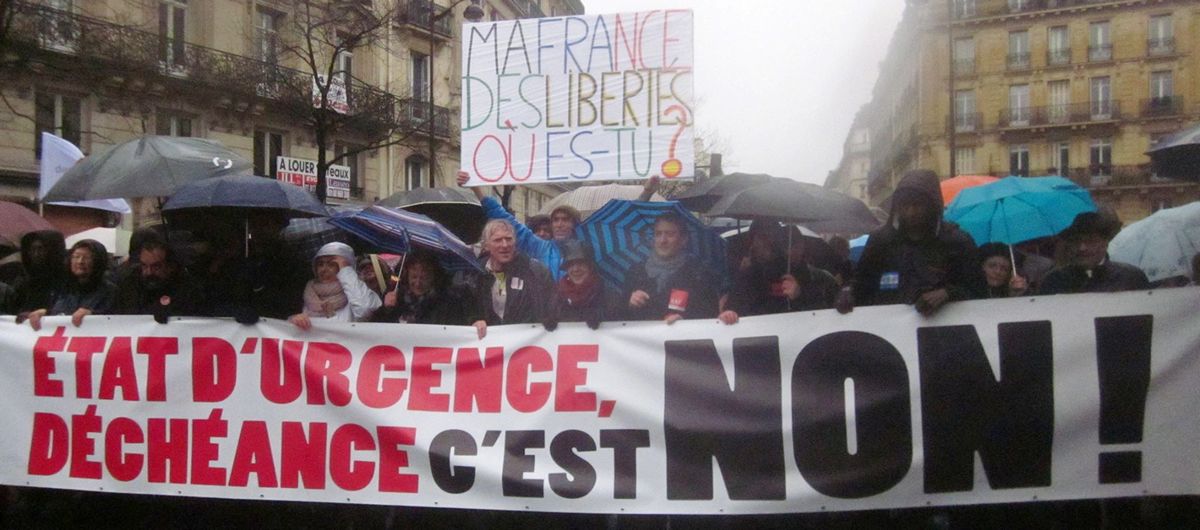
Demonstration in Paris says "NO!" to the state of emergency, January
30, 2016. (LDH)
The second and final round of France's Presidential election takes place on Sunday, May 7. The official results published by the Ministry of the Interior of the Republic, following the first round held on April 23, determined that Emmanuel Macron and Marine Le Pen received the most votes (24.01 per cent and 21.30 per cent, respectively) and will compete in the second round.[1]
Far from contributing to the resolution of the social, economic, cultural and political problems which plague French society, the election results will further aggravate the crisis in which the French nation-state is mired. In the first place, it is indisputable that the two contending candidates deprive the working class of its own voice in this election. On the elections themselves, there is nothing free or fair about them. They are being held under a government of police powers, in the conditions of a state of emergency which has become permanent after two years. The stated purpose of this état d'urgence is to "reclaim lawless areas" ("zones de non-droit") -- working class cities and suburbs -- and to pacify resistance to the neo-liberal agenda. The Ministry of the Interior reinforced this state of emergency for the first round of voting. More than 50,000 police officers and gendarmes (including 12,000 for Paris alone) with 7,000 Sentinel Operation soldiers were mobilized to "secure" the 67,000 polling stations. This is one quarter of the total number of law enforcement personnel in France, and the same scenario will be repeated during the second round on May 7.
The problems and contradictions plaguing France have stood unresolved since the end of the Second World War and in particular since the national liberation struggle of the Algerian people. The contradictions have resurfaced with a vengeance since the collapse of the Soviet Union, which was supposed to prove the superiority of Western democracy and end the Cold War. Far from it, the neo-liberal agenda adopted and the nation-wrecking it engendered has compounded all the problems by further enshrining, instead of eliminating, the privileges the police powers enforce.
Current problems stem from the arrangements which were brought into being following World War II. The U.S. imperialists imposed the Marshall Plan and NATO on Europe with the avowed aim of dominating the continent, conquering new markets and, within the framework of the Cold War, containing communism.
 The state and the
Constitution of the Fifth Republic
are
themselves illegitimate. They emerged from a military coup d'etat
in Algiers on May 13, 1958, with the aim of keeping Algeria
French and crushing the national liberation struggle of the
Algerian people. The institutions of the Fifth Republic are based
on the crushing of the aspirations of the French people expressed
in the Constitution of 1946 which said, "In the morrow of the
victory achieved by the free peoples over the regimes that had
sought to enslave and degrade humanity, the people of France
proclaim anew that every human being, without distinction of
race, religion or creed, possesses sacred and inalienable
rights." The Constitution of 1946 further proclaimed, "as being
especially necessary to our times the political, economic and
social principles" enumerated as the duty to work and the right
to employment, the right to belong to the union of one's choice,
the right to strike, nationalization of national public services,
the right to protection of health, material security, rest and
leisure and the right for children and adults to instruction,
vocational training and culture.
The state and the
Constitution of the Fifth Republic
are
themselves illegitimate. They emerged from a military coup d'etat
in Algiers on May 13, 1958, with the aim of keeping Algeria
French and crushing the national liberation struggle of the
Algerian people. The institutions of the Fifth Republic are based
on the crushing of the aspirations of the French people expressed
in the Constitution of 1946 which said, "In the morrow of the
victory achieved by the free peoples over the regimes that had
sought to enslave and degrade humanity, the people of France
proclaim anew that every human being, without distinction of
race, religion or creed, possesses sacred and inalienable
rights." The Constitution of 1946 further proclaimed, "as being
especially necessary to our times the political, economic and
social principles" enumerated as the duty to work and the right
to employment, the right to belong to the union of one's choice,
the right to strike, nationalization of national public services,
the right to protection of health, material security, rest and
leisure and the right for children and adults to instruction,
vocational training and culture.
This Constitution lies in tatters, but the rulers do not want to heed the calls for its renewal coming from the base of French society, which is fighting for the dignity of labour and demanding that the rights of all be upheld. On the contrary, changes to the constitution are considered for purposes of making government of police powers permanent and "lawful." This contempt of democratic principles will never legitimize the rulers' attacks on the working class and its organizations. Nor will it legitimize the anti-social offensive against the working people in the cities and countryside, the criminalization of their struggles for the recognition of their rights, the imprisonment of trade union leaders, the state-organized racist attacks on the working class that get blamed on the people who are called xenophobic and racist, the ghettoization of people of Maghrebian and African origin or the criminalization and social exclusion of youth and the "suburban crisis."
Today, fighting within the ranks of the rulers is very sharp. One faction represents financial interests which are striving to control the French state to secure a base which can compete with Germany in particular and directly exploit the county's resources and markets, as well as those of the neo-colonial French empire. Not only German capital is fishing in troubled waters but also the U.S. imperialists who want a candidate which favours their interests. They are attempting to either smash France as a competitor or control France so as to dominate Europe through the aggressive NATO alliance as well as through the European Union. They want France as a springboard for the domination of Asia as well as to deprive it of and usurp its influence and interests in the Middle East and Africa.
|
|
The creation of the European Union had similar aims. Through the pooling of European markets, the basis of which was the reconstitution of the big monopoly pre-war coal and steel cartels, the founders of the European Union, in particular the French monopolies, sought to protect their colonial empires, especially on the African continent. At present, the development of the European Union is taking place through the transfer of state sovereignty to supranational bodies, such as the European Commission, as well as warmongering blocs, alliances and coalitions such as NATO. It signifies the abandonment of the sovereignty of the peoples and of countries to the moloch of international finance capital and the grave dangers which lie ahead. This includes the slaughter of the African peoples the imperialists are planning under the social-Darwinist and neo-Malthusian arguments that overpopulation is the cause of crises including migration, wars and starvation.
In the name of a free market within the European Union, the privatization of all public services and assets required by modern societies is proceeding at a rapid pace. Everything nationalized in the aftermath of the World War II is now either privatized already or in the course of being privatized, including railways and communications. Under the impetus of the European Commission, in the name of the unification of labour standards in the European Union and the modernization of markets, neo-liberal anti-worker laws such as the 2016 Labor Law are imposed and French jurisdiction stands for nothing.
The French election is a fraud because it is not the
people
who define the agenda and provide France with an aim which serves
them. The system whereby the only role for the people is to mark
a ballot to hand over their political right to govern themselves
to alien class forces will not legitimate the election result.
The election is providing no alternative to the current state of
affairs. Pitting against each other two factions which serve
alien class interests to keep the working class in check shows
that even when the old two-party system is finished, its form
continues to be used to deprive the people of any say over the
candidates selected and make sure that their program does not
represent the people's striving for empowerment.
In fact, the official vote count after the first round, including spoiled and blank ballots, shows that more than 65 per cent of voters choose neither Macron nor Le Pen for the second round and that these two candidates obtained only slightly more than 35 per cent of the registered vote. Counting the abstentions, it means that the candidates of the oligarchy were imposed on 80 per cent of registered voters.[2]
The program of Emmanuel Macron is to Make France Great Again by establishing a new "contract of rights, duties and responsibilities." His new contract is based on denial of rights to destroy all social gains. Macron's program is the continuation of the program of Margaret Thatcher of whom he is an admirer -- the anti-social offensive based on the "free market," which says that society has no responsibility to its members. It is not a program to solve the crisis and change the situation in favour of the people. Macron's discourse on "the spirit of French conquest," a phrase he pulled out during the May 3 election debate, is a discourse of empire-builders, a continuation of the same neo-liberal program that has deepened the crisis of French nation-building. Despite this, he is called a centrist and the election in France is presented as a clash of ideologies with Marine Le Pen representing what is called the "extreme right xenophobic" position.
 The program of Marine Le Pen
is to renew this "spirit of
French conquest" and restore the French dream ("roman national").
She says "the winds of history have turned" and order must be
restored in France. Marine Le Pen represents the spirit of
pre-revolutionary France, the état c'est moi spirit
of Louis XIV, with her slogan, "In the name of the [French]
people." Her agenda of empire to "restore order to our country by
re-conquering the lost territories of the Republic" is against
the call of history. She says she will "put [the] economy back in
order by valuing labour; reorganizing our social system by
rejecting the globalization of benefits; restore order to the
state by restoring its authority, its means (justice, police,
defense)." Such a program does not even pretend to address the
need of the French people to establish a new regime so that they
can govern themselves directly instead of giving the power of
representation to others who govern through the police
powers.
The program of Marine Le Pen
is to renew this "spirit of
French conquest" and restore the French dream ("roman national").
She says "the winds of history have turned" and order must be
restored in France. Marine Le Pen represents the spirit of
pre-revolutionary France, the état c'est moi spirit
of Louis XIV, with her slogan, "In the name of the [French]
people." Her agenda of empire to "restore order to our country by
re-conquering the lost territories of the Republic" is against
the call of history. She says she will "put [the] economy back in
order by valuing labour; reorganizing our social system by
rejecting the globalization of benefits; restore order to the
state by restoring its authority, its means (justice, police,
defense)." Such a program does not even pretend to address the
need of the French people to establish a new regime so that they
can govern themselves directly instead of giving the power of
representation to others who govern through the police
powers.
This dream of a "pastoral" France is a figment of Le Pen's imagination and a fraud to establish a government of police powers favouring specific private interests. France was never pastoral for the peasantry, which was subjected to the most oppressive feudal yoke before the creation of the Republic and to capitalist oppression since then. Today, French farmers are at the mercy of international finance capital and its man-eating free trade agenda, not "foreigners." It is moribund capitalism that maintains feudal relations to expropriate the peasantry and migrant workers on a global scale. Marine Le Pen pits her retrogression into a pastoral past against the "modernization" of Macron into a hopeless future. Both support the use of unfettered police powers to maintain the order of the oligopolies against the working class and people. This is not only precisely what keeps the people of France without power to effect change which favours them, but also points the way forward -- that the working class must constitute the nation at long last and vest sovereignty in the people and unite with all others on the world scale on the basis of their common cause.
Free trade and protectionism are two sides of the same coin. The current disputes over membership in the European Union are in fact a reflection of the dangerous inter-monopoly and inter-imperialist contradictions over control of resources, spheres of influence and zones for the export of capital and labour. Elections based on national forms which no longer function are utterly incapable of sorting these contradictions out. The solution to free trade is not "protectionism" and the solution to neo-liberalism is not old forms of the welfare state. The solution is for the working class to constitute the nation and engage in nation-building on a modern, proletarian internationalist basis and unite the workers of all lands to take up their historic responsibility to vest sovereignty in themselves, not the propertied interests which today operate as oligopolies rampaging all over the world leaving death and destruction in their wake.
To change the direction of the economy to serve the people, the working people are striving to take charge of their own affairs by advancing their own programs and demands. Only this will settle scores with the rotten and desperate forces based on old colonial and new neo-colonial imperialist values which have seized power through force and fraud.
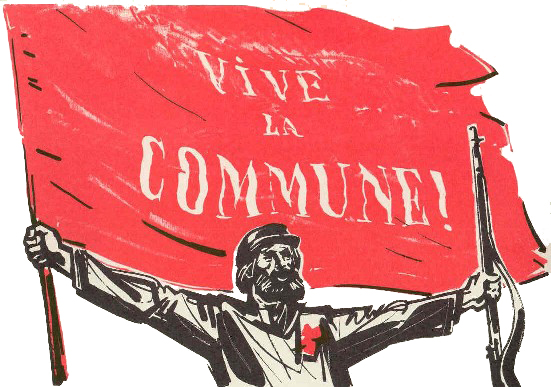 In 1871, the Paris proletariat
rose up in arms and created
the Paris Commune, a mighty historic attempt to establish its own
rule. The Paris Commune was brutally crushed by enlisting the
help of the conquering Prussian army which ushered in a period of
dark reaction.[3]
In 1871, the Paris proletariat
rose up in arms and created
the Paris Commune, a mighty historic attempt to establish its own
rule. The Paris Commune was brutally crushed by enlisting the
help of the conquering Prussian army which ushered in a period of
dark reaction.[3]
The content of French rule has not changed since that reaction seized the upper hand, no matter what forms have been brought into being to keep the content in place. The claim that the fight in France is between "extreme right" and "centrist" solutions is a fraud. The fight is between the Old and the New. To accuse the people of xenophobia and extreme right beliefs, or try to mobilize them behind neo-liberal so-called centrist candidates and fraudulent movements such as Emmanuelle Macron's En Marche cannot change the fact that these are not the alternatives to the present crisis in which the French nation-state is mired. It makes no sense to persist in seeing the problem as an antagonism between right-wing, extreme right-wing, centre and left ideologies and policies, since this does not correspond to reality.
We are confronted with a particular historical moment. The old forms established in the constitutions of the bourgeois nation-states as created in the 18th and 19th centuries, and which gave birth to the kind of civil society that was necessary for the bourgeoisie to protect its property rights at that time, have outplayed their role, are exhausted and no longer function.
In this French election, the financial oligarchs are embroiled in a life-and-death competition to seize power as they have been time and again in the past, through forms which include multi-party elections and a legislature which, in the language of the French revolution, is called a National Assembly. This competition time and time again brought the propertied classes to power, not the people who shed their blood to overthrow their oppressors and win empowerment for themselves. Civil society, with its hundreds of organizations, institutions and agencies is today reduced to government of police powers to keep the people's movement for empowerment in check. Governments of police powers mean that all rights as recognized in the previous period, all forms such as the legislatures and civil society organizations, all laws, no longer enforce any aim of nation-building but the narrow private interests of the biggest financial oligarchs. The promise of the French revolution of Liberty, Equality, Fraternity lies in tatters. What are called the traditional parties are shown to be incapable of functioning and, for that matter, not fit to rule. They are not only corrupt, but above all else unable to provide France with a goal that fulfills its needs and the needs of its people in the 21st century.
 What these elections show is
not the "impossible choice" with
which the working class is said to be confronted. The bankruptcy
of the French institutions and state of the oligopolies shows
that the only choice is to take up the alternative. The working
class must lead the people to bring about political renewal and a
modern constitution which truly vests sovereignty in the people.
A genuine political movement of the people will achieve this
historic task.
What these elections show is
not the "impossible choice" with
which the working class is said to be confronted. The bankruptcy
of the French institutions and state of the oligopolies shows
that the only choice is to take up the alternative. The working
class must lead the people to bring about political renewal and a
modern constitution which truly vests sovereignty in the people.
A genuine political movement of the people will achieve this
historic task.
The big bourgeoisie is so desperate that it manufactures movements without motion, said to be a "renewal" and "the expression of the popular will." Such is the En Marche "movement" of Emmanuel Macron which, should he win, then needs to be implanted in the National Assembly to claim legitimacy for the mandate to serve the moloch of capital ruling over France in its competition with German capital and U.S. striving to control Europe. It is the height of absurdity and incoherence.
The workers and people of France demand a new system capable of fulfilling their need for nation-building based on the affirmation and defence of the inalienable modern rights of all.
Grave dangers lie ahead for the French people and the peoples of Europe who already suffered two cataclysmic world wars. The peoples of the world should take heed and unite to bring in the New. The Canadian working class and people stand as one with the French working class and people in their striving to uphold their rights and fight for the rights of all.
Notes
1. Results of the First Round of
the French Presidential
Election held on April 23:
|
Candidates
|
Votes
|
|
|
|
|
Number
|
% of registered
|
% of votes
|
|
Nicolas DUPONT-AIGNAN
|
1,695186
|
3.56
|
4.00
|
|
Marine LE PEN
|
7,679,493
|
16.14
|
21.30
|
|
Emmanuel MACRON
|
8,657,326
|
18.19
|
24.01
|
|
Benoît HAMON
|
2,291,565
|
4.82
|
6.36
|
|
Nathalie ARTHAUD
|
232,428
|
0.49
|
0.64
|
|
Philippe POUTOU
|
394,582
|
0.83
|
1.09
|
|
Jacques CHEMINADE
|
65,598
|
0.14
|
0.18
|
|
Jean LASSALLE
|
435,365
|
0.91
|
1.21
|
|
Jean-Luc MÉLENCHON
|
7,060,885
|
14.84
|
19.58
|
|
François ASSELINEAU
|
332,588
|
0.70
|
0.92
|
|
|
|
|
|
|
Total
|
36,058,813
|
75.78
|
100.00
|
2. The party system divides the people to keep them out of power. Even the results of the First Round of the French election could have been very different if the Socialist Party, which since the beginning of the election with its candidate Benoit Hamon was unable to increase support, withdrew in favour of Jean-Luc Mélenchon. This would potentially have given Mélenchon, said to be the candidate of the left, nearly 27 per cent of the vote, thus eliminating Marine Le Pen from the second round. A second round between what "financial analysts" and the corporate media called the radical left and the centre was to be avoided at all costs, which is why it was important for the candidate of the Socialist Party who garnered 6.2 per cent of the vote to stay in the race. He can now claim election expenses from the public purse.
3. The independent French state was in fact established under the French kings, Louis XIII (1601 - 1643) and Louis XIV (1638 - 1715). Its independence from the Vatican was expressed eloquently when Louis XIV declared in 1655, "L'État, c'est moi!" and on this basis created a centralized state unprecedented in history under Comptroller Jean-Baptiste Colbert. Control of New France was taken out of the hands of Cardinal Richelieu's "Compagnie des Cents Associés" and placed under Royal Administration in 1663, with a Minister of the Marine, an Intendant, a military Governor and a "Sovereign Council." The French Revolution one hundred years later in 1789 with its slogan of Égalité, Liberté, Fraternité brought into being the bourgeois nation-state. In the name of the people it vested sovereignty in the propertied classes, not the Crown.
The French state which was brought into being by the French Revolution conferred citizenship based on nationality but, even then, never recognized the right of the sans culottes to govern. It did not confer citizenship rights to its colonial subjects in the French Antilles or North Africa, including Algeria and, to this day, the racism of the French state against north Africans and immigrants which it considers undesirable is one of its distinguishing features.
France then went through a series of revolutions and restorations of monarchy, and then a coup d'état in February 1848 by Louis Napoléon Bonaparte about which Marx wrote in The 18th Brumaire of Louis Bonaparte :
"On December 2 [1848] the February Revolution is conjured away as a cardsharp's trick, and what seems overthrown is no longer the monarchy but the liberal concessions that had been wrung from it through centuries of struggle. Instead of society having conquered a new content for itself, it seems that the state has only returned to its oldest form, to a shamelessly simple rule by the sword and the monk's cowl. [...] Society seems now to have retreated to behind its starting point; in truth, it has first to create for itself the revolutionary point of departure – the situation, the relations, the conditions under which alone modern revolution becomes serious."
Marx concluded:
"Bourgeois revolutions, like those of the eighteenth century, storm swiftly from success to success; their dramatic effects outdo each other; men and things seem set in sparkling brilliants; ecstasy is the everyday spirit; but they are short-lived; soon they have attained their zenith, and a long crapulent depression lays hold of society before it learns soberly to assimilate the results of its storm-and-stress period. On the other hand, proletarian revolutions, like those of the nineteenth century, criticize themselves constantly, interrupt themselves continually in their own course, come back to the apparently accomplished in order to begin it afresh, deride with unmerciful thoroughness the inadequacies, weaknesses and paltrinesses of their first attempts, seem to throw down their adversary only in order that he may draw new strength from the earth and rise again, more gigantic, before them, recoil ever and anon from the indefinite prodigiousness of their own aims, until a situation has been created which makes all turning back impossible, and the conditions themselves cry out:
Hic Rhodus, hic salta!
Here is the rose, here dance!"
June 8 Election Campaign Starts in Britain
Urgent Need to Develop the Independent Politics of the Working Class and Uphold the Rights of All!
On April 18, Prime Minister Theresa May announced her decision to call a general election on June 8. The following day a majority of MPs in the House of Commons approved this plan. Dissolution of Parliament will take place on Wednesday, May 3.
What does the Prime Minister think these elections will accomplish? Will they "secure the strong and stable leadership the country needs to see us through Brexit and beyond," as she says?
The referendum on Brexit
sorted out none of the
contradictions within the ruling class, how does May propose that
a general election will sort them out? It won't. It is just
another desperate attempt to use her control of the state
apparatus to wipe out contending factions within the financial
oligarchy while keeping the working class and people in check. It
has nothing to do with finding a way forward consistent with the
needs of the working people who live in England, Scotland, Wales
or Ireland or providing Britain with an aim consistent with the
needs of the people for peace and an end to the plunder of their
resources and destruction of the productive forces, let alone the
peoples of the world.
The election call and campaign reveal the deep all-sided crisis in which Britain but also France and all members of the EU are mired as a result of the stranglehold of the monopolies and dangerous inter-imperialist contention for control over Europe. After the referendum on the EU in June last year which led to the resignation of David Cameron and the "coronation" of Theresa May, the government has continued to further align Britain with the U.S. imperialists in their own striving to control Europe and take over Asia.
As for the fraud of what are called the Brexit negotiations, these elections will not sort out the interests of different sets of oligopolies and monopoly interests which are fighting it out, using everything at their disposal. This includes the armed forces and NATO and the covert methods and dirty tricks in the arsenal of what are called intelligence agencies. In this respect, Theresa May faces deep divisions within the Conservative Party itself which the elections will also not sort out.
Neither elections, nor the Party system itself or Parliament function in the way they were designed to do a century and more ago. They were designed to sort out differences between the factions of the ruling class organized into the two main traditional political parties so as to reach reasonable accommodations, while maintaining the working class and people in check, tied to their apron strings. Since then, the working class won the right to vote but, despite establishing a political party of its own, the system which is said to be representative blocks them from coming to power.
But the striving for empowerment of the working class is what has always forced open the door to progress. Today, more than ever, the working class continues to fight for an economy that provides for all and for justice, peace and freedom. This is why the ruling elite and their media are using this election, just as they used the Referendum on Brexit, to push a massive disinformation campaign to deprive the working class and people of their own outlook, on the basis of which they can find their bearings and make advance. The working people require a political movement which expresses the demands of the working class for an end to the regime which refuses to recognize their rights on any front whatever -- whether to a livelihood, security in retirement, healthcare, education, housing and peace of mind, as well as peace by withdrawing Britain from NATO and all military adventures around the world.
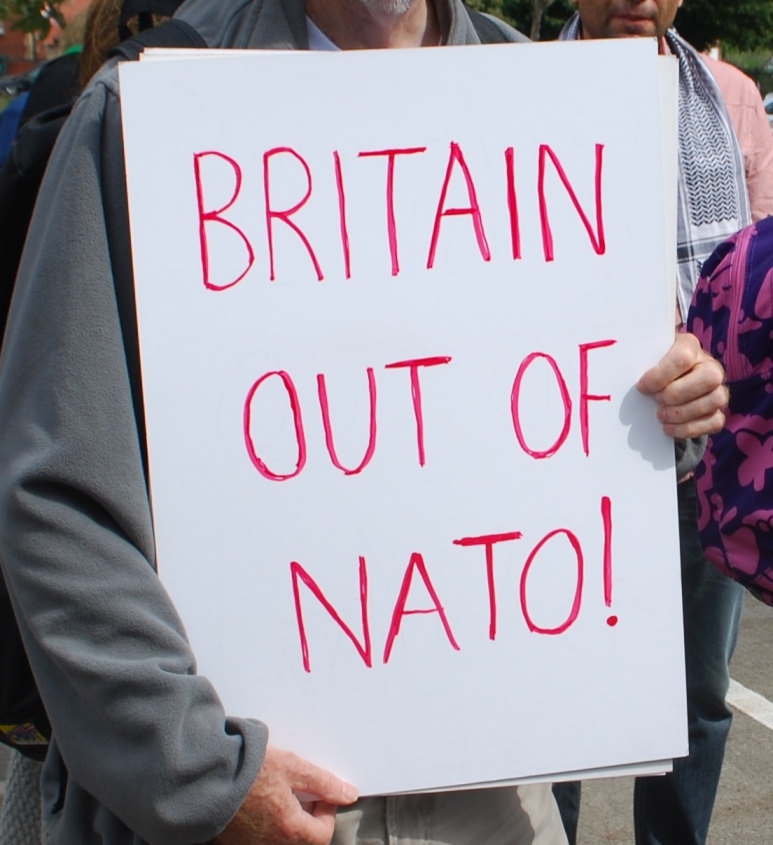 In the context of Brexit, Theresa
May spoke about the
priority of "economic certainty." It is the last thing the
election is likely to bring. The problems of the economy will not
be solved by any of the competing sets of oligarchs, who make
their fortunes based on plundering the state treasury,
speculating on financial markets and wiping each other out. The
demand of the working class for manufacturing to serve the needs
of the economy is not on the agenda and it is not a matter of
good or bad policies of good or bad politicians. The ruling elite
is now also haunted by the fact that "post-Brexit" they stand to
lose the City of London as a centre of finance capital. This
problem is in fact nothing new, merely resurfacing at this time
in the competition with Germany and the U.S. to control Europe's
and the world's financial markets and transactions.
In the context of Brexit, Theresa
May spoke about the
priority of "economic certainty." It is the last thing the
election is likely to bring. The problems of the economy will not
be solved by any of the competing sets of oligarchs, who make
their fortunes based on plundering the state treasury,
speculating on financial markets and wiping each other out. The
demand of the working class for manufacturing to serve the needs
of the economy is not on the agenda and it is not a matter of
good or bad policies of good or bad politicians. The ruling elite
is now also haunted by the fact that "post-Brexit" they stand to
lose the City of London as a centre of finance capital. This
problem is in fact nothing new, merely resurfacing at this time
in the competition with Germany and the U.S. to control Europe's
and the world's financial markets and transactions.
In this regard, the sun set on the British Empire long ago. Margaret Thatcher and Tony Blair promised to Make Britain Great Again on the basis of the destruction of even the conception of a society which is responsible for the well-being of its members and assaults on the entire British working class. This has been coupled with continued brutal dispossession of the peoples of Scotland, Wales and Ireland, the rest of Europe and Asia, Africa and even Latin America and the Caribbean.
The alleged choice that May presents between stability and strong government or chaos is the same call as was made by David Cameron. It is a desperate hope that by strengthening the arbitrary authority of police powers, the people will submit their wealth willingly to the moloch of finance capital. But the working class and peoples of England, Scotland, Wales and Ireland say No! They have continued to express their own demands, independent of the in-fighting between this and that faction of the ruling class. To blame the people for the backward ideological beliefs of the rulers and demand that they choose between one faction and the other will not succeed in staunching the people's striving for empowerment, justice and peace.
To divide the people and disorient them, the rulers have launched a vicious campaign of denigrating the stands and character of Jeremy Corbyn. This too is done to destroy the Labour Party and disorient the working class and people. It shows that the main target of attack in these elections is the working class and all those who want to open a path to progress and demand their right to have a say over all the affairs which affect their lives. It is to make sure the slogan for a change in the direction of the economy does not get off the ground and the anti-war movement is smashed. The call for "strong government," for the use of unfettered police powers, will not sort out the climate of anarchy and violence which accompany the destruction of the public authority which was established after World War II. All attempts to deny and criminalize the people's right of conscience under the guise that this is what causes instability, must be opposed.
Let us also use this election to defeat all attempts to blame the working class and people for the warmongering, chauvinist, racist and anti-people stands which the ruling class itself espouses. Let us step up our demands for the right to healthcare and education, for the right to pensions and a decent standard of living, for a change in the direction of the economy, against the dictates of the plutocrats and oligopolies and the state that serves them, for the security of the people which lies in the fight for the rights of all, and for the recognition of the rights of all citizens and residents which comprise the UK and of the peoples of Scotland, Wales and Ireland as well as for an anti-war government.
These are dangerous times.
All Out to Develop the Independent
Politics of
the
Working Class and
Uphold the Rights of All! Workers of All
Countries, Unite!
Centenary of Lenin's April Theses
Concrete Analysis of Concrete Conditions

Lenin's return from exile (From
a
painting
by
M.
G.
Sokolov)
One hundred years ago, on the evening of April 16, 1917 (April 3 in the old Russian calendar), V.I. Lenin, leader of the Bolshevik Party returned to Russia from years of working in exile. The following day, he addressed a meeting of Bolsheviks and gave ten theses elaborating the next stage of the struggle following the February 1917 overthrow of Tsardom. The April Theses were subsequently published in the Party's newspaper, Pravda, as the article The Tasks of the Proletariat in the Present Revolution.
The April Theses emerged as a result of concrete analysis of the concrete conditions facing the communist and workers' movement in Russia at that time. Their adoption by the Bolshevik Party permitted the Party to work out the tactics required for the success of the October Socialist Revolution just six months later. J.V. Stalin later remarked that it was Lenin's April Theses which enabled the Party "to emerge onto the new road at one stride."
On the occasion of the 100th anniversary of the April Theses, TML Weekly is publishing below material on their significance, as well as excerpts from Lenin's article and background information. In this centenary year of the Great October Socialist Revolution, TML Weekly will continue to provide commentary, materials and historical information related to the Great October Socialist Revolution to assist the communist and workers' movement to open society's door to progress today by appreciating the significance of that great historic event.
Concrete Analysis of Concrete Conditions
Vladimir Lenin, leader of the Bolshevik Party stressed repeatedly the necessity for revolutionary theory to guide revolutionary practice. Within this concept is the insight that without first having revolutionary practice, revolutionary theory cannot exist or develop.
The kernel of Lenin's April Theses following the February 1917 overthrow of the Tsar's regime emerged seamlessly from his revolutionary theory summing up the failed revolution of 1905. The 1905 revolutionary practice did not succeed in overthrowing the autocracy but gave rise to a rich treasure house of Leninist practice and theory, and a form of governance that the revolutionary workers and peasants embraced and nurtured, the Soviets.[1]
The analysis in the April Theses is founded on the aim and outlook of the modern working class and its Communist Party. The aim is the emancipation of the working class. The aim of emancipation of the working class cannot succeed without the emancipation of all humanity and the complete elimination of social classes within society.
The outlook of the working class is guided by its aim for emancipation. The outlook exists in the present and how the present poses itself. This means the outlook of the modern working class is based in materialism, in the here and now, specifically dialectical and historical materialism and the analysis of the objective and subjective conditions and its revolutionary practice to open a path forward to emancipation. The outlook never deviates from the aim of emancipation and remains rooted in the present, what Lenin described as concrete analysis of concrete conditions and the development of revolutionary theory to guide revolutionary practice.
What are the contradictions and problems in the present that must be resolved for the working class to advance towards its aim of emancipation of itself and all humanity? This question poses itself today and posed itself in 1917. The answer is found in the analysis of the concrete conditions in the present and the development of revolutionary theory to guide the revolutionary practice. Lenin elaborated this necessity in his 1901 work, What Is to be Done? Burning questions of our movement, where appears his famous phrase, "Without revolutionary theory there can be no revolutionary movement."
The April Theses summed up the developments since the February 1917 overthrow of the Tsarist autocracy and seizure of state power by a liberal bourgeois provisional government. The Theses analysed how the present posed itself within the concrete objective and subjective conditions facing the working class, peasantry and soldiers, and furnished a guide forward for the Bolshevik Party and revolutionary masses.
Within the analysis of the concrete conditions, the Theses summarized practical politics to move the bourgeois democratic revolution towards a socialist revolution to resolve three main questions facing Russia and the oppressed nations within the Russian Empire:
1) how to distribute land to landless and poor peasants when the land was still mostly held by the landed aristocracy;
2) how to extricate Russia from the slaughter of the imperialist World War amongst the big powers;
3) how to solve the problem of food security, which had become a crisis verging on famine throughout Russia and the oppressed nations.
The three burning questions of the day were summed up in practice in the revolutionary slogan: Land, Peace and Bread!
Lenin wrote that the liberal bourgeoisie was incapable
of
solving those problems because of its imperialist class character
and would prove its incapacity in practice. The task of the
Bolsheviks was to lead the people in holding the liberal
bourgeois government to account for the failure to end the
imperialist war and solve the land and food issues, and to show
the masses demanding change that the only resolution in practice
was for the Soviets of Workers, Soldiers and Peasant Deputies to
seize state power through revolution. The call, "All Power to the
Soviets" soon rang out throughout Russia and became more and more
insistent through the work of the Bolsheviks to expose the
liberal bourgeois government.
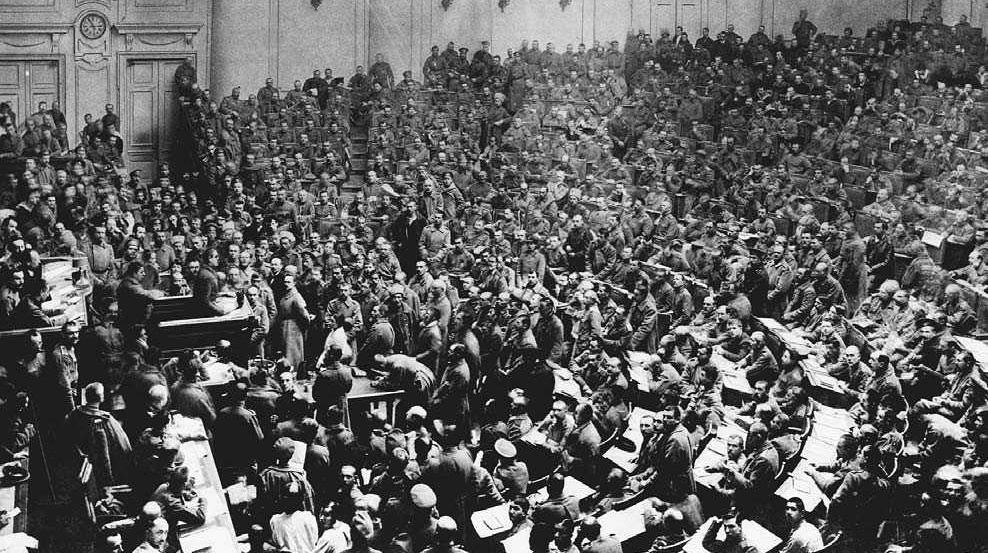
First Conference of Soviets, held in Petrograd between April 11 and 16,
1917.
The underlying problem was how to mobilize the revolutionary masses to open a path for the resolution in practice of the three burning issues and to bring into being Soviet state power. This entailed identifying what social forces were capable of fulfilling the practical politics of the three main issues, and how to organize those social forces to fulfil their revolutionary role.
The foundation for victory of the coming revolutionary transformation was found in the organizing work of the Bolshevik Party since the publication of What Is to Be Done? in 1901 and before. Without having already built a solid Communist Party and base of communist and broader independent working class institutions, and inroads into influencing the soldiers and peasantry, the tasks ahead that Lenin outlined in the Theses leading to the Great October Socialist Revolution in 1917 could not have been accomplished. The revolution would not have been successful without the development of the theoretical clarity of Leninism and the organizing of the Leninist Communist Party and its institutions throughout the country.
The Bolshevik Party nurtured and developed the great invention of the revolutionary masses during the 1905 revolution, the Soviets of Workers' Deputies. The Soviets became an instrument of practical politics of the revolutionary workers, soldiers and peasants. Following the February 1917 overthrow of the Tsarist regime, the activists of the Bolshevik Party worked tirelessly within the Soviets and more broadly to hold to account the liberal bourgeois provisional government and its adherents within the Soviets for its unfulfilled promises. They emphasized deeds not words. The more the liberal bourgeois government reneged on its promises, especially on withdrawing from the war, guaranteeing food security, and distributing land to the peasantry, and the more the provisional government resorted to violent suppression of the people and their Bolshevik leadership, the more the momentum and support shifted throughout the country, and specifically within the Soviets, towards the Bolshevik Party and its revolutionary program for a new direction in the economy and working class nation-building.
|
|
The April Theses provided the theoretical clarity and guidance necessary for the practical politics of the Bolshevik Party to flourish. By early September 1917, the Soviets of Workers' Deputies in the main industrial cities had elected Bolshevik leadership. The slogan "All Power to the Soviets" resounded throughout Russia and became a reality less than a month later in the Socialist Revolution, as the Soviets, now led by the Bolsheviks, seized political power and deprived the liberal bourgeois government of its power.[2]
The Leninist Party had prepared through its revolutionary practice and development of theory the basic subjective conditions for success in turning the February bourgeois democratic revolution into the Great October Socialist Revolution. The April Theses analyzed the conditions and provided a guide to action for the revolutionary practice and practical politics leading to the October Revolution.
The objective and subjective conditions Lenin analyzed in the present as they posed themselves in 1917 are not those of today in the twenty-first century. The conditions Lenin analyzed in the April Theses were not those of nineteenth century Europe or those following the 1905 revolution. They were the conditions of the present in 1917 and how they posed themselves.
The April Theses dealt with the concrete conditions in the present and mapped a way forward for the members and supporters of the Bolshevik Party and the Russian revolutionary masses to achieve their demand for land, peace and bread, and the conquest of political power in the Great October Socialist Revolution. The task at hand in the present following the October Revolution was its defence against imperialist attacks and subversion from the overthrown social classes, and the mobilizing of the masses in a historic nation-building project to develop the social productive forces with the aim to emancipate the working class and all humanity.
Notes
1. "The Soviets of Workers' Deputies -- which were assemblies of delegates from all mills and factories -- represented a type of mass political organization of the working class, which the world had never seen before. The Soviets that first arose in 1905 were the prototype of the Soviet power, which the proletariat, led by the Bolshevik Party, set up in 1917. The Soviets were a new revolutionary form of the creative initiative of the people. They were set up exclusively by the revolutionary sections of the population, in defiance of all laws and prescripts of tsardom. They were a manifestation of the independent action of the people who were rising to fight tsardom." (History of the CPSU(b) (Short Course))
2. In September 1917 "the Bolsheviks began intensive preparations for the (October) uprising. Lenin declared that, having secured a majority in the Soviets of Workers' and Soldiers' Deputies in both the capitals -- Moscow and Petrograd -- the Bolsheviks could and should take the state power into their own hands. Reviewing the path that had been traversed, Lenin stressed the fact that 'the majority of the people are for us.' In his articles and letters to the Central Committee and the Bolshevik organizations, Lenin outlined a detailed plan for the uprising showing how the army units, the navy and the Red Guards should be used, what key positions in Petrograd should be seized in order to ensure the success of the uprising, and so forth." (History of the CPSU(b) (Short Course))
Tasks of the Proletariat in the Present Revolution (April Theses)

Lenin delivers April Theses
at meeting of the Bolshevik Party held in
the Tauride Palace in
Petrograd on April 17, 1917 (April 4 in the old
Russian calendar), one day after
returning from exile.
Theses (Excerpts)
1) In our attitude towards the war, which under the new [provisional] government of Lvov and Co. unquestionably remains on Russia's part a predatory imperialist war owing to the capitalist nature of that government, not the slightest concession to "revolutionary defencism" is permissible.
The class-conscious proletariat can give its consent to a revolutionary war, which would really justify revolutionary defencism, only on condition: (a) that the power pass to the proletariat and the poorest sections of the peasants aligned with the proletariat; (b) that all annexations be renounced in deed and not in word; (c) that a complete break be effected in actual fact with all capitalist interests.
In view of the undoubted honesty of those broad sections of the mass believers in revolutionary defencism who accept the war only as a necessity, and not as a means of conquest, in view of the fact that they are being deceived by the bourgeoisie, it is necessary with particular thoroughness, persistence and patience to explain their error to them, to explain the inseparable connection existing between capital and the imperialist war, and to prove that without overthrowing capital it is impossible to end the war by a truly democratic peace, a peace not imposed by violence.
The most widespread campaign for this view must be organised in the army at the front.
Fraternisation.
2) The specific feature of the present situation in Russia is that the country is passing from the first stage of the revolution -- which, owing to the insufficient class-consciousness and organisation of the proletariat, placed power in the hands of the bourgeoisie -- to its second stage, which must place power in the hands of the proletariat and the poorest sections of the peasants.
This transition is characterised, on the one hand, by a maximum of legally recognised rights (Russia is now the freest of all the belligerent countries in the world); on the other, by the absence of violence towards the masses, and, finally, by their unreasoning trust in the government of capitalists, those worst enemies of peace and socialism.
This peculiar situation demands of us an ability to adapt ourselves to the special conditions of Party work among unprecedentedly large masses of proletarians who have just awakened to political life.
3) No support for the Provisional Government; the utter falsity of all its promises should be made clear, particularly of those relating to the renunciation of annexations. Exposure in place of the impermissible, illusion-breeding "demand" that this government, a government of capitalists, should cease to be an imperialist government.
4) Recognition of the fact that in most of the Soviets of Workers' Deputies our Party is in a minority, so far a small minority, as against a bloc of all the petty-bourgeois opportunist elements, from the Popular Socialists and the Socialist-Revolutionaries down to the Organising Committee (Chkheidze, Tsereteli, etc.), Steklov, etc., etc., who have yielded to the influence of the bourgeoisie and spread that influence among the proletariat.
The masses must be made to see that the Soviets of Workers' Deputies are the only possible form of revolutionary government, and that therefore our task is, as long as this government yields to the influence of the bourgeoisie, to present a patient, systematic, and persistent explanation of the errors of their tactics, an explanation especially adapted to the practical needs of the masses.
As long as we are in the minority we carry on the work of criticising and exposing errors and at the same time we preach the necessity of transferring the entire state power to the Soviets of Workers' Deputies, so that the people may overcome their mistakes by experience.
5) Not a parliamentary republic -- to return to a parliamentary republic from the Soviets of Workers' Deputies would be a retrograde step -- but a republic of Soviets of Workers', Agricultural Labourers' and Peasants' Deputies throughout the country, from top to bottom.
Abolition of the police, the army and the bureaucracy.[1]
The salaries of all officials, all of whom are elective and displaceable at any time, not to exceed the average wage of a competent worker.
6) The weight of emphasis in the agrarian programme to be shifted to the Soviets of Agricultural Labourers' Deputies.
Confiscation of all landed estates.
Nationalisation of all lands in the country, the land to be disposed of by the local Soviets of Agricultural Labourers' and Peasants' Deputies. The organisation of separate Soviets of Deputies of Poor Peasants. The setting up of a model farm on each of the large estates (ranging in size from 100 to 300 dessiatines, according to local and other conditions, and to the decisions of the local bodies) under the control of the Soviets of Agricultural Labourers' Deputies and for the public account.
7) The immediate union of all banks in the country into a single national bank, and the institution of control over it by the Soviet of Workers' Deputies.
8) It is not our immediate task to "introduce" socialism, but only to bring social production and the distribution of products at once under the control of the Soviets of Workers' Deputies.
9) Party tasks:
(b) Alteration of the Party Programme, mainly:
(2) On our attitude towards the state and our demand for a "commune state"[2];
(3) Amendment of our out-of-date minimum programme;
10. A new International.
We must take the initiative in creating a revolutionary International, an International against the social-chauvinists and against the "Centre".
[...]
Notes
1. I.e., the standing army to be replaced by the arming of the whole people. (Lenin)
2. I.e., a state of which the Paris Commune was the prototype. (Lenin)
3. Instead of "Social-Democracy," whose official leaders throughout the world have betrayed socialism and deserted to the bourgeoisie (the "defencists" and the vacillating "Kautskyites"), we must call ourselves the Communist Party. (Lenin)
[...]
Lenin's Return from Forced Exile
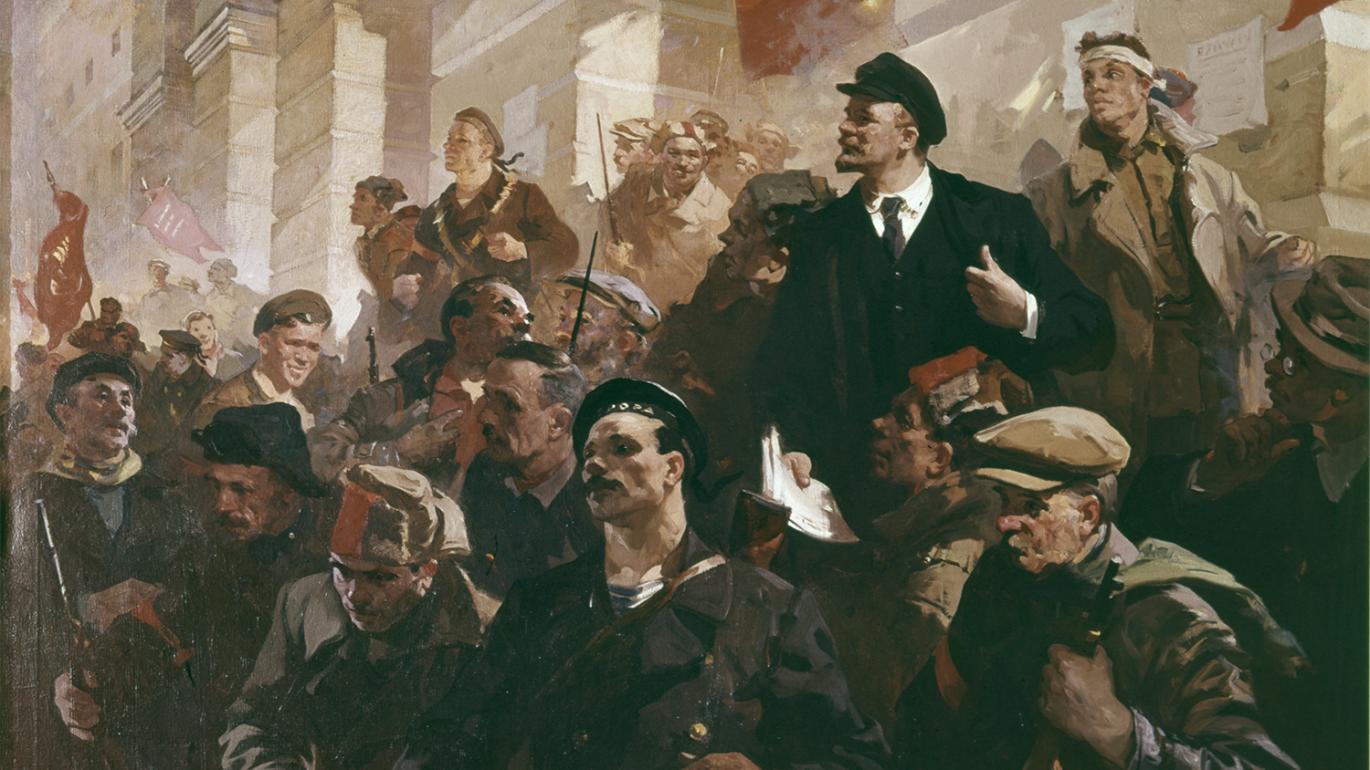
Painting of Lenin at the Finland Railway Station (N. Babasiouk, 1960)
While still in Switzerland, Lenin, upon receiving the first news of the (February) revolution, had written his "Letters From Afar" to the Party and to the working class of Russia, in which he said:
"Workers, you have displayed marvels of proletarian heroism, the heroism of the people, in the civil war against tsardom. You must now display marvels of organization, organization of the proletariat and of the whole people, in order to prepare the way for your victory in the second stage of the revolution."
 Lenin arrived in Petrograd
on the night of April 3.
Thousands
of workers, soldiers and sailors assembled at the Finland Railway
Station and in the station square to welcome him. Their
enthusiasm as Lenin alighted from the train was indescribable.
They lifted their leader shoulder high and carried him to the
main waiting room of the station. There the Mensheviks Chkheidze
and Skobelev launched into speeches of "welcome" on behalf of the
Petrograd Soviet, in which they "expressed the hope" that they
and Lenin would find a "common language." But Lenin did not stop
to listen; sweeping past them, he went out to the masses of
workers and soldiers. Mounting an armoured car, he delivered his
famous speech in which he called upon the masses to fight for the
victory of the Socialist revolution. "Long live the Socialist
revolution!" were the words with which Lenin concluded this first
speech after long years of exile.
Lenin arrived in Petrograd
on the night of April 3.
Thousands
of workers, soldiers and sailors assembled at the Finland Railway
Station and in the station square to welcome him. Their
enthusiasm as Lenin alighted from the train was indescribable.
They lifted their leader shoulder high and carried him to the
main waiting room of the station. There the Mensheviks Chkheidze
and Skobelev launched into speeches of "welcome" on behalf of the
Petrograd Soviet, in which they "expressed the hope" that they
and Lenin would find a "common language." But Lenin did not stop
to listen; sweeping past them, he went out to the masses of
workers and soldiers. Mounting an armoured car, he delivered his
famous speech in which he called upon the masses to fight for the
victory of the Socialist revolution. "Long live the Socialist
revolution!" were the words with which Lenin concluded this first
speech after long years of exile.
Back in Russia, Lenin flung himself vigorously into revolutionary work. On the morrow of his arrival he delivered a report on the subject of the war and the revolution at a meeting of Bolsheviks, and then repeated the theses of this report at a meeting attended by Mensheviks as well as Bolsheviks.
These were Lenin's famous April Theses, which provided the Party and the proletariat with a clear revolutionary line for the transition from the bourgeois to the Socialist revolution.
Lenin's theses were of immense significance to the revolution and to the subsequent work of the Party. The revolution was a momentous turn in the life of the country. In the new conditions of the struggle that followed the overthrow of tsardom, the Party needed a new orientation to advance boldly and confidently along the new road. Lenin's theses gave the Party this orientation.
Lenin's April Theses laid down for the Party a brilliant plan of struggle for the transition from the bourgeois-democratic to the Socialist revolution, from the first stage of the revolution to the second stage -- the stage of the Socialist revolution. The whole history of the Party had prepared it for this great task. As far back as 1905, Lenin had said in his pamphlet, Two Tactics of Social-Democracy in the Democratic Revolution, that after the overthrow of tsardom the proletariat would proceed to bring about the Socialist revolution. The new thing in the theses was that they gave a concrete, theoretically grounded plan for the initial stage of the transition to the Socialist revolution.
|
|
The transitional steps in the economic field were: nationalization of all the land and confiscation of the landed estates, amalgamation of all the banks into one national bank to be under the control of the Soviet of Workers' Deputies, and establishment of control over the social production and distribution of products.
In the political field, Lenin proposed the transition from a parliamentary republic to a republic of Soviets.... Lenin proposed to replace the parliamentary republic by a Soviet republic as the most suitable form of political organization of society in the period of transition from capitalism to Socialism.
"The specific feature of the present situation in Russia," the theses stated, "is that it represents a transition from the first stage of the revolution -- which, owing to the insufficient class-consciousness and organization of the proletariat, placed the power in the hands of the bourgeoisie -- to the second stage, which must place the power in the hands of the proletariat and the poorest strata of the peasantry."
"Not a parliamentary republic -- to return to a parliamentary republic from the Soviets of Workers' Deputies would be a retrograde step -- but a republic of Soviets of Workers', Agricultural Labourers' and Peasants' Deputies throughout the country, from top to bottom."
Under the new (liberal bourgeois) government (replacing the Tsarist regime), the Provisional Government, the war continued to be a predatory imperialist war, Lenin said. It was the task of the Party to explain this to the masses and to show them that unless the bourgeoisie were overthrown, it would be impossible to end the war by a truly democratic peace and not a rapacious peace.
As regards the Provisional Government, the slogan Lenin put forward was: "No support for the Provisional Government!"
Lenin further pointed out in the theses that our Party was still in the minority in the Soviets, that the Soviets were dominated by a bloc of Mensheviks and Socialist-Revolutionaries, which was an instrument of bourgeois influence on the proletariat. Hence, the Party's task consisted in the following:
"It must be explained to the masses that the Soviets of Workers' Deputies are the only possible form of revolutionary government, and that therefore our task is, as long as this government yields to the influence of the bourgeoisie, to present a patient, systematic, and persistent explanation of the errors of their tactics, an explanation especially adapted to the practical needs of the masses. As long as we are in the minority we carry on the work of criticizing and exposing errors and at the same time we preach the necessity of transferring the entire power of state to the Soviets of Workers' Deputies...."
This meant that Lenin was not calling for a revolt against the Provisional Government, which at that moment enjoyed the confidence of the Soviets, that he was not demanding its overthrow, but that he wanted, by means of explanatory and recruiting work, to win a majority in the Soviets, to change the policy of the Soviets....
This was a line envisaging a peaceful development of the revolution.
Lenin further demanded that the "soiled shirt" be discarded, that is, that the Party no longer call itself a Social-Democratic Party. The parties of the Second International and the Russian Mensheviks called themselves Social-Democrats. This name had been tarnished and disgraced by the opportunists, the betrayers of Socialism. Lenin proposed that the Party of the Bolsheviks should be called the Communist Party, which was the name given by Marx and Engels to their party....
Lastly, Lenin in his theses demanded the creation of a new International, the Third, Communist International, which would be free of opportunism and social-chauvinism....
On April 14, a Petrograd City Conference of Bolsheviks was held. The conference approved Lenin's theses and made them the basis of its work.
Within a short while the local organizations of the Party had also approved Lenin's theses.
The whole Party, with the exception of a few individuals ... received Lenin's theses with profound satisfaction.
(History of the Communist Party of the
Soviet Union (Bolsheviks) Short Course, 1939)
|
|
Website: www.cpcml.ca Email: editor@cpcml.ca
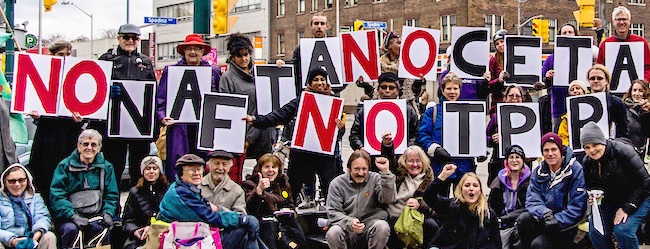
 The "economic leitmotif," as
the propaganda campaign to justify neo-liberal free trade was dubbed,
was diversionary CPC(M-L) pointed out. In 1984 the federal government
under Brian Mulroney started changing the aim of the economy from
providing Canada-wide universality to making the monopolies competitive
on global markets, the new aim officially proclaimed by the
Chrétien Liberals when they came to power in 1993. During that
period, Ottawa cut transfer payments to the provinces. For instance,
the amount cut unilaterally to Quebec was $14 billion. In 1983-84,
federal transfer payments to Quebec represented 29 per cent of Quebec's
budget. By 1997-98 under the Liberals, they represented 13 per cent.
Yet Quebec continued to pay the same taxes to Ottawa.[
The "economic leitmotif," as
the propaganda campaign to justify neo-liberal free trade was dubbed,
was diversionary CPC(M-L) pointed out. In 1984 the federal government
under Brian Mulroney started changing the aim of the economy from
providing Canada-wide universality to making the monopolies competitive
on global markets, the new aim officially proclaimed by the
Chrétien Liberals when they came to power in 1993. During that
period, Ottawa cut transfer payments to the provinces. For instance,
the amount cut unilaterally to Quebec was $14 billion. In 1983-84,
federal transfer payments to Quebec represented 29 per cent of Quebec's
budget. By 1997-98 under the Liberals, they represented 13 per cent.
Yet Quebec continued to pay the same taxes to Ottawa.[